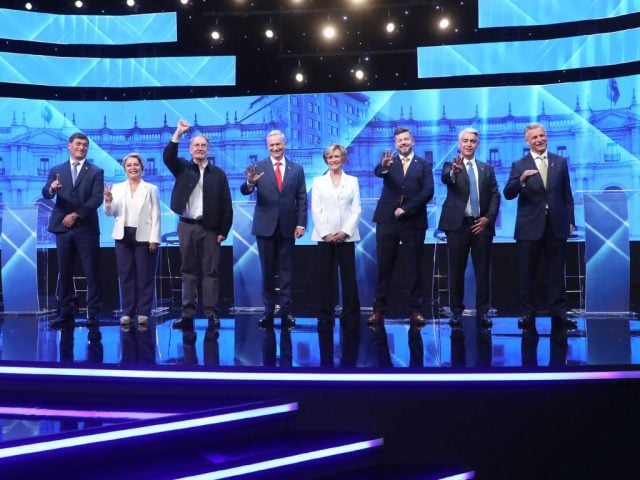Original article: Ni golpes ni sorpresas: análisis del debate más medido de la campaña
Measured Debate Reveals More Calculation Than Confrontation as Presidential Election Nears
With just three weeks to go before the first round, a new presidential debate took place this Sunday featuring eight candidates vying for La Moneda. This time, the event was characterized by a lack of clashes or significant confrontations, maintaining a moderate tone.
The debate, which lasted over two and a half hours, was moderated by journalists Soledad Onetto and Iván Valenzuela, and notably exhibited an apparent non-aggression pact among the right-wing candidates.
Analysts agree that the debate did not substantially alter the electoral landscape. Calculated messaging predominated, with focused proposals and damage control taking precedence over direct confrontations.
In an interview with El Ciudadano, the Rector of the Universidad Academia de Humanismo Cristiano, Álvaro Ramis, analyzed the presidential debate. According to Ramis, the format executed by Canal 13 placed significant emphasis on the right-wing primary featuring Matthei, Kast, Kaiser, and Parisi, as there was a clear allocation of time focused on their disputes, which left Jeannette Jara observing the discussion from a distance, with less focus on her proposals.
Ramis noted the night’s major winners were “both Jeannette Jara and Kast, in their own ways, as they were the prominent candidates who dominated the debate symbolically; everyone else seemed to be attacking or referencing them as central figures.”
In this light, Ramis remarked that Kaiser also performed well: “he navigated effectively, targeting his audience niche, but could not expand; rather, the debate continues to revolve around who is the most far-right and confrontational, as Kast feels constrained in needing to temper his proposals while holding the top position on the right today,” he commented.
Regarding the potential for influence on voter turnout, Ramis suggested that this might have more impact within the right-wing voters, indicating that Kaiser may have siphoned some votes from Kast, as the latter “appears overly constrained, too protected, and too defensive, while Kaiser was much freer to express his views quite openly,” he stated.
“As for the rest of the spectrum, I believe it does not influence much, except that I think it gives more assurance to Jeannette Jara’s center-left and left voters, as she appeared more solid than in the previous debate, thereby confirming her base, so to speak. I do not think it will draw in new voters, but it does secure Jeannette Jara’s supporter base,” he added.
On candidate Jeannette Jara, Ramis emphasized that there was a noticeable change both in form and substance. He noted that she altered her wardrobe, projecting a more presidential image than in the prior debate. He also highlighted her approach: she did not get flustered or engage in minor quarrels, managing to present a government perspective and a program, which he considered strategically significant.
Finally, regarding the standout moments, Ramis mentioned that rather than significant triumphs, there were more anecdotal situations. One of the most notable instances was the exchange between José Antonio Kast and Harold Mayne-Nicholls, which occurred while discussing the recent controversy over excessive electricity charges. In that context, Mayne-Nicholls asked Kast whether, if he were the owner of an electricity company facing such an issue, he would refund the money or “play dumb.” The term irritated the republican candidate, marking one of the tensest moments of the evening.
“I believe it flustered him and placed him in a position of some discomfort, so I think it could have been a pivotal moment, as it is a very straightforward question for any candidate to answer; however, Kast’s poor response and his bad attitude could have strategic consequences,” Ramis concluded.

